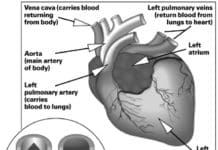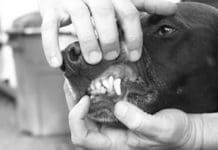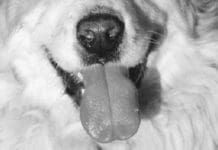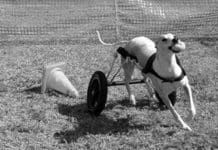Dog Bloat: Causes, Signs, and Symptoms
Imagine seeing your dog exhibit some strange symptoms, rushing him to the vet within minutes, only to have the vet proclaim his case to be hopeless and recommend euthanasia. For too many dog owners, that's the story of bloat, an acute medical condition characterized by a rapid accumulation of gas in the stomach.
Understanding the Dog Respiratory System
The respiratory system functions rather miraculously. Vital for life, critical for the health of the whole body, it’s one of the major ways the dog’s body unites his external environment with his inner milieu. As a primary site of contact with the outer world, the lungs are susceptible to diseases that can be caused by any airborne germ, irritant, or toxin that happens to be floating around.
Limber Tail Syndrome
The syndrome seems to be caused by muscle injury possibly brought on by overexertion, says Janet Steiss, DVM, PhD, PT. Steiss is an associate professor at Auburn University's College of Veterinary Medicine and coauthor of the 1999 study on limber tail that pinpointed the nature of the muscle damage.
Your Dog’s Mouth
The mouth is the site of the two most common canine diseases.
The Canine Sense of Smell
however.üIt can be a sign of immune problems if a dog's nose is normally black
A Paralyzed Dog is Still Flying High
and took four-month-old Gideon home in August 2002.
Seeking an outlet for Gideon's energy
Anesthesia-Free Teeth Cleaning For Your Dog
Most of us have seen signs or advertisements for anesthesia-free teeth cleaning" for dogs and cats. To most people
How to Keep a Dog Calm After Surgery
and then waits for Tater to offer an approximation of "dead." (Above) Once Tater offers "dead
Conventional and Holistic Veterinarians Working Together
Every day the already dazzling array of options for caring for your dog grows even more. There are myriad modalities in the realm of holistic care, including complementary and alternative options, as well as conventional veterinary medicine, with its low- and high-tech diagnostic and treatment procedures. Which way do you go when your dog has a health concern?
The Spay/Neuter Debate: When and Should You Do It?
In some dog-related circles, the question of surgical sterilization, otherwise known as spaying (females) and neutering (males), is sure to spark hot debate. Humane associations and shelters are vocal proponents of sterilization for population control, a stand that makes sense considering they're often the ones who deal firsthand with the tragic consequences of unplanned breeding.
Structure of the Canine Eye
The dog's eye is pretty much a garden-variety mammalian eye, with some notable adaptations that have evolved over the millennia. It is a globe with two fluid-filled chambers (anterior and posterior). The chambers are separated by the lens, the structure that helps focus light beams onto the rear part of the eye, the retina. The eye's outer, clear surface, the cornea, offers protection to the inner eye and helps the lens focus light onto the rear of the eyeball, the retina.



















